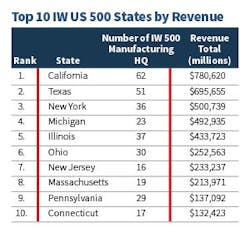The IW US 500: The (Cloudy) State of Manufacturing
Manufacturing is in the midst of a new Industrial Revolution. 3-D printing, the Internet of Things, robotics, artificial intelligence. These technologies are present in a wide range of sectors -- from automaking to medical devices. The possibilities have reinvigorated interest in the art of making things.
Meanwhile, manufacturers are nervously optimistic about what the future holds as the Trump administration continues its push for major economic reforms. It's unclear how much of an impact the administration has already had on manufacturing.
Total IW US 500 revenues declined for the second straight year to $5.07 trillion, down from $5.38 trillion last year. Momentum may be building, though, as new policies take shape.
"Economic growth, according to the nation's supply executives, got off to a hot start beginning in September 2016," says Timothy Fiore, chair of manufacturing for the Institute for Supply Management's Business Survey Committee. "The combination of the potential for less regulation (or a reduction in increased regulation) coupled with low energy prices provided the needed spark. Currently, uncertainty around many government-directed issues -- border tax, targeted anti-dumping decrees, ACA repeal, increased international tension and the uncertainty that that brings -- likely are contributing to a wait-and-see attitude."
The oil and gas industry had a major impact on overall IW US 500 revenues. The sector, which tied for the largest on the list with 54 companies, experienced an average revenue drop of 13.7%. Oil and gas industry declines were directly related to lower fuel prices, Fiore says. Oil prices rebounded to about $50 a barrel by the end of 2016 from a low of about $30 per barrel earlier in the year. The low prices are impacting the industry's investment returns, he says. "The big issue with this industry is long-term massive capital investment that takes years to come on line, and many times they miss the market," Fiore says.
While declining oil and gas prices often benefit energy-intensive industries, such as chemicals, other manufacturers that supply materials for pipelines and oilfield development, including the steel industry, may struggle as producers put projects on hold.
Another factor impacting manufacturers in 2016 was the strong dollar, which decreased demand for exports, says Jeff French, national managing partner, consumer and industrial products for tax and advisory services firm Grant Thornton. However, the rebounding housing industry boosted sales for construction-related products. For example, Nashville-based building products manufacturer Louisiana-Pacific Corp.'s (IW500/344) revenues increased 18% to $2.2 billion, while net income rose nearly 150%. "Some things tied to the construction industry have been reasonably solid and have seen a fairly steady uptick since the recession," says Paul Green, partner, Ernst & Young LLP.
The Bigger Picture
The current and future state of manufacturing is being shaped by factors beyond the natural ebb and flow of the global economy. For one, the Industrial Internet of Things (IIoT), or Industry 4.0, has become a competitive differentiator for many companies. Also, President Trump's proposed economic and trade policies could benefit or hurt different industries.
Some manufacturers are more advanced than others in adopting IIoT technologies, says Green. "Companies that are the large industrial manufacturers are slow to adapt to the new technology and disruptive threats," Green observes.
Nearly 90% of manufacturing leaders believe that adopting Industry 4.0 technologies are a way to improve productivity, but only about one in four see opportunities to use these advances to build new revenue streams, according to a Boston Consulting Group study published in late 2016.
Still, many leading IW US 500 manufacturers are either bringing new IIoT technologies to market or incorporating them into their products. General Electric Co. (IW500/5) is betting big on IIoT technologies as part of former CEO Jeffrey Immelt's plan to create a "digital industrial" company. In early 2016, GE launched Predix, a cloud-based platform for the IIoT. The company invested more than $4 billion in 2016 on IIoT technologies, Immelt said in the company's annual report. Digital software orders were $4 billion, in 2016, up 22%. Predix orders should total $1 billion in 2017.
Immelt's enthusiasm for IIoT and advanced manufacturing technologies was somewhat tempered by a statement in the company's annual letter to shareholders. The letter warned shareholders that "there is deep skepticism toward the ideas that powered economic expansion for a generation, with concepts like innovation, productivity, and globalization being challenged and protectionism on the rise. We're in an era when some very basic assumptions about the global economy are being tested -- an era when trust in big institutions is so low that the most valued 'strategy' is simply change in any form. For an American company, our country is diverging from the rest of the world. We will be less of a leader in trade."
But the letter also indicated the potential for some positive changes as the nation is "stripping away years of bad regulatory and economic practices to promote competitiveness."
The Trump Effect
GE's mixed message is similar in tone to how many manufacturers and analysts view the Trump administration's bold stance on taxes, trade and regulations. Companies and industry experts have expressed both a sense of uneasiness and cautious optimism.
"The Trump administration started off with a very positive impact but due to lack of legislative change, has driven a lot of uncertainty into the market," Fiore says. "Business likes stability; it can plan using known assumptions. With uncertainty comes indecisiveness."
For example, Trump's promise to cut regulations, such as Environmental Protection Agency air quality laws, could help many manufacturers be more competitive. Nucor Corp. (IW 500/64) and other steel industry representatives have praised the Trump administration's investigation into foreign steel dumping and his proposal to rebuild the nation's infrastructure as major steps forward.
But Trump's tough talk about China and Mexico, including threats to withdraw from NAFTA, could put some manufacturers at a disadvantage. In 2016, Ford Motor Co.'s (IW500/4) net income dropped nearly $2.8 billion primarily due to a pension adjustment, according to the company's annual report, and costs associated with the company's decision to abandon plans for a new plant in Mexico, various news organizations reported. Ford announced its decision to scrap its construction plans shortly after Trump criticized the move.
"Talk of trade barriers makes manufacturers very nervous," French says. "Reviewing and improving trade agreements to ensure the U.S. is receiving its fair share of trade business relative to trading partners is a good idea, but just imposing trade barriers could have very negative consequences."
With so much uncertainty, manufacturers are starting to reassess their strategic plans and consider alternatives, says Green. This might mean seeking different sourcing options to avoid penalties.
"I think people have to be a lot more thoughtful about what I would consider manufacturing footprint decisions," he says. "We're encouraging our clients to be very focused on having a deep understanding of their supply chain."
About the Author
Jonathan Katz
Former Managing Editor
Former Managing Editor Jon Katz covered leadership and strategy, tackling subjects such as lean manufacturing leadership, strategy development and deployment, corporate culture, corporate social responsibility, and growth strategies. As well, he provided news and analysis of successful companies in the chemical and energy industries, including oil and gas, renewable and alternative.
Jon worked as an intern for IndustryWeek before serving as a reporter for The Morning Journal and then as an associate editor for Penton Media’s Supply Chain Technology News.
Jon received his bachelor’s degree in Journalism from Kent State University and is a die-hard Cleveland sports fan.

